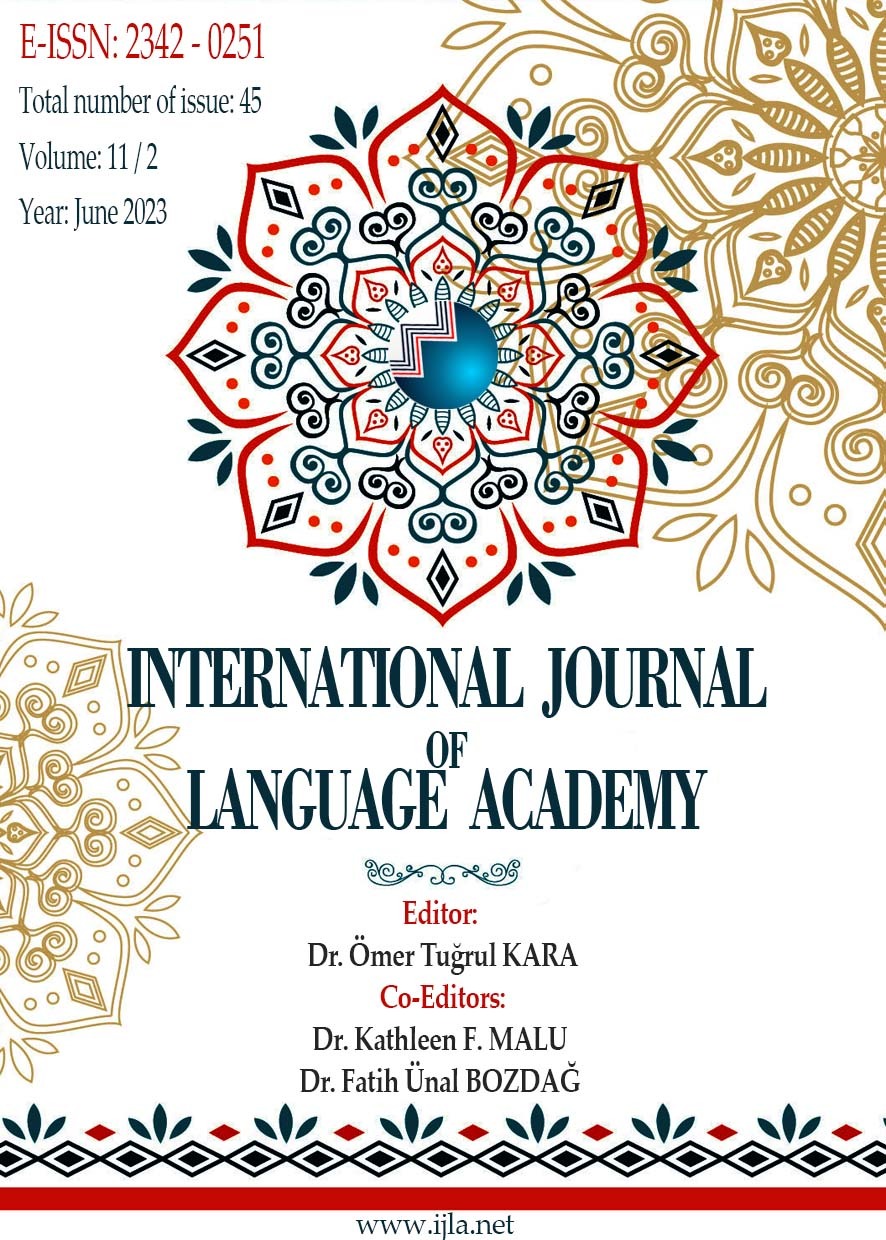Author :
Abstract
Bu araştırmada ortaokul Türkçe ders kitaplarındaki dil bilgisi terim varlığının ve bunlara ilişkin öğretmen görüşlerinin incelenmesi amaçlanmıştır. Bu amaçla nitel araştırma yöntemlerinden biri olan durum çalışması kullanılmıştır. Araştırmada veriler, doküman incelemesi ve görüşme yoluyla elde edilmiştir. Görüşme yoluyla elde edilen verilerin analizinde içerik analizi tekniği kullanılmıştır. Araştırmanın doküman incelemesi boyutunda MEB Ortaokul ve İmam-Hatip Ortaokulu 5, 6, 7 ve 8. Sınıf Türkçe Ders Kitapları incelenmiş, görüşme boyutunda ise Millî Eğitim Bakanlığında görev yapan 15 Türkçe öğretmeninin terimlerle ilgili görüşleri alınmıştır. Araştırmanın doküman incelemesi sonucunda 5. sınıfta 9 adet, 6. sınıfta 19 adet, 7. sınıfta 46 adet, 8. sınıfta 51 adet dil bilgisi terimi olmak üzere Türkçe ders kitaplarında toplamda 125 adet dil bilgisi teriminin kullanıldığı tespit edilmiştir. Bunun yanı sıra görüşlerine başvurulan öğretmenler, Türkçe ders kitaplarında öğrencilere yoğun bir şekilde dil bilgisi terimi aktarıldığını, bu durumun ana dili öğretimi süreciyle ölçme değerlendirme sürecini olumsuz etkilediğini, dil bilgisi terimlerinin farklı biçimde adlandırılmalarının öğretim programında belirtilen kazanımların gerçekleşmesini zorlaştırdığını belirtmişlerdir. Ayrıca öğretmen görüşlerinden hareketle terimlerin sınıf seviyeleri bakımından dengeli dağılmadığı, dil bilgisi terim dağılımının öğrencilerin gelişim özelliklerine uygun olmadığı, dil bilgisi terim varlığının ders kitabı – müfredat – LGS arasında bir uyum göstermediği, dil bilgisi terim yoğunluğunun öğrencilerde zihinsel karmaşaya neden olduğu ve kalıcı öğrenme oluşturmadığı belirlenmiştir.
Keywords
Abstract
This research aimed to examine the existence of grammar terms in secondary school Turkish textbooks and teachers' opinions about them. For this purpose, a qualitative research method was used for a case study. The data in the research was obtained through document review and interviews. Content analysis technique was used to analyze the data obtained through interviews. The document analysis part of the research examined the 5th, 6th, 7th and 8th grade Turkish textbooks of Ministry of National Education Secondary School and Imam-Hatip Secondary School. During the interview, the opinions of 15 Turkish teachers working in the Ministry of National Education were taken about the terms. As a result of the document analysis of the research, it was determined that a total of 125 grammar terms were used in Turkish textbooks. 9 of these terms are in the 5th, 19 in the 6th, 46 in the 7th and 51 in the 8th grade textbooks. The teachers whose opinions were consulted stated that the grammar terms were heavily transferred to the students in the Turkish textbooks; this situation negatively affected the mother tongue teaching process and the assessment and evaluation process. Also, the different naming of the grammar terms made achieving the achievements specified in the curriculum difficult. In addition, based on the teachers' opinions, it was found that the terms were not evenly distributed in terms of grade levels, and the grammar term distribution was not suitable for the developmental characteristics of the students. There is no harmony between the textbook, the curriculum, and the high school entrance exam (HSEE) in terms of the existence of grammatical terms. It has been determined that grammar term density causes mental confusion in students and does not create permanent learning.





